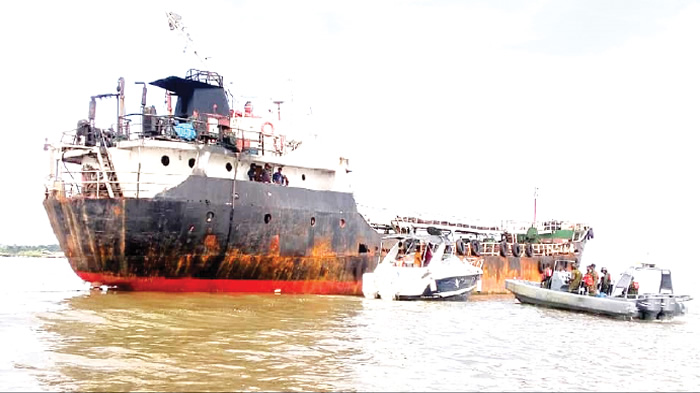
The HOMEF said the manner the vessel was destroyed was wrong and harmful to the environment and human lives.
The Executive Director of HOMEF, Mr Nnimmo Bassey stated this in a statement issued in Benin on Saturday.
The statement released by Kome Odhomor, Media/Communication Lead of the foundation, noted that the burning of the vessel did not conform with international best practices.
“Oil theft in Nigeria is an organised crime and a huge industry with local and international collaborators involved in the illegal deal.
“It has historical roots which have taken different dimensions and are manifesting in several forms, some of which had been covered until recently.
“With the recent destruction of a vessel containing stolen crude oil, it is rather shocking to note that the continuous cry of pollution made by Nigerians has evaded the attention of the leadership of the Joint Task Force (JTK) of the Nigerian Military and the Nigerian National Petroleum Company Ltd,” he said.
Though the JTF justified the vessel’s destruction as a warning to those involved in oil theft and an attempt to discourage such activities, the HOMEF director noted, however, that the bombing of the vessel merely signaled authorities’ indifference to the safety of the people and the environment.
The environmentalist drew attention to the already dire conditions in the Niger Delta due to gas flaring, oil spills, and other forms of pollution.
The destruction of the seized vessel, he noted, would worsen the environmental degradation.
He called for an urgent investigation into the incident, questioning the motivation behind blowing up a vessel carrying 800,000 barrels of crude oil and causing significant environmental damage.
According to him, the catastrophic consequences of that act are so huge that a single drop of crude oil can contaminate 25 litres of water.
“With 800,000 barrels of crude oil spilled, the destruction would devastate fisheries, livelihoods and directly harm people.
“There is a lack of consideration for the constitutional right to a safe environment on the part of our security forces, and we call for improved training regarding environmental and climate crises.
“It is crucial for government agencies to realise the impact that the destruction of rogue vessels has on the marine ecosystem and regional pollution,” Bassey said:
“Safe methods of handling such vessels, including rendering them inoperable, should be adopted.
“Outright destruction of vessels on the high seas is not environmentally acceptable.
“Collaboration between the Joint Task Force and environmental experts, alongside those genuinely concerned about the environment, is necessary to protect lives and livelihoods,” the HOMEF boss said.
(NAN)





